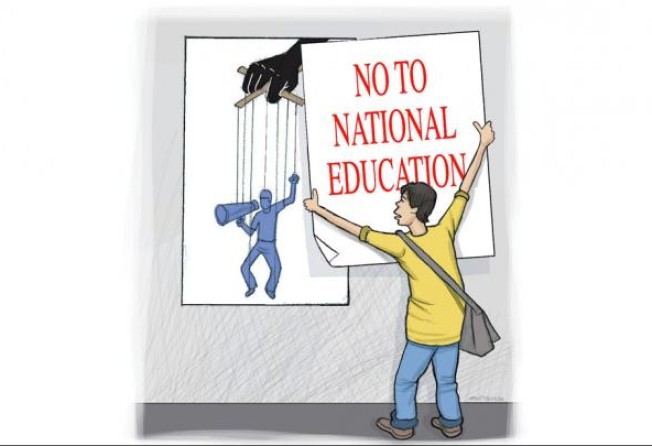HK's student protesters must stay focused on national education
Chang Ping says the attacks on Hong Kong students protesting against national education are a reminder of the fateful labels hurled at the Tiananmen student movement. This time, they must stay focused

Here we are again, faced with another student movement. In Hong Kong, a campaign opposing the introduction of moral and national education in schools is gaining momentum: protesters are taking turns to fast in a hunger strike relay; some are calling for a class boycott. The movement, started by a group of secondary school students who call themselves Scholarism, has received support from different sectors of society. Their main demand is for the government to scrap the course.
We see the same young faces, the same steel in their eyes, the burning passion, the fearlessness. And we see again parents take to the streets, academics and journalists rally in support, and government officials try to placate with token gestures. Needless to say, all this reminds one of the Tiananmen democracy movement 23 years ago.
A turning point of Tiananmen was the notorious "4/26 editorial" that branded the students' movement an upheaval. That People's Daily editorial of April 26, 1989 incensed protesters: the demonstrations grew, the hunger strikes began, and a demand to retract statements made in the editorial became a rallying call of the campaign. Even today, some student leaders of the time still live in its shadow.
The main thrust of the editorial was to vilify the students' push for democracy, recasting it as nothing short of a disturbance with catastrophic consequences for the nation: "If we tolerate this disturbance or try to appease it, and let it go unchecked, serious chaos will occur … a China with very good prospects and a very bright future will become a chaotic and unstable China without any future."
What's happening in Hong Kong is very different from Tiananmen. Yet in recent days, the kind of vilification of the national education campaign that we've seen in public debate reminded me of the 4/26 editorial. These efforts don't carry the weight of the state-sanctioned People's Daily, but they clearly have some official backing, and their arguments bring to mind events in Beijing 23 years ago. This is Hong Kong's 4/26 moment.
Typical of the slurs levelled at the students were found in one episode of ATV Focus - "Constructive forces versus destructive forces: learn to distinguish good from evil or risk becoming pawns" - and a Ta Kung Pao editorial, "The political motives of black hands behind the 'brainwashing' charges".
Their argument uses two main tactics. One is to belittle the intelligence and character of the young students, and deny that they are capable of independent thought and action. They are described as puppets manipulated by a "minority group of people with evil intent", the sacrificial pawns of a political plot. These behind-the-scenes manipulators are called "black hands". A "black hand" of 22 years ago, Liu Xiaobo, is today a Nobel Peace Prize winner, and locked up in a mainland jail.
What's so abnormal about adults shaping the thinking of the young? In the history of the Communist Party, young people influenced by the revolutionary ideals of their elders are hailed as progressive members of society. And the adults who pass on these ideas are described as great leaders.
Students may be open to adult influence, but that doesn't absolve them of the responsibility for their own actions. The Scholarism activists have shown their capacity for sound thought and action, and the parents, teachers and academics who support them have also demonstrated courage and responsibility. But the media are so intent on blackening their name and pointing fingers at purported black hands that they are blind to this.
Their other favoured tactic is to brand the students' protest as a grave social disturbance.
"Destructive forces" are trotted out. Detractors claim these black hands have one mission - to destabilise Hong Kong so the world could see that a Hong Kong under Chinese rule would fail. They would never understand that to speak up against social wrongs and injustices is itself a constructive force.
In their narrative, young innocent students are being used by evil, cunning adults who had been plotting for a long time. But to what end? It turned out that Western, anti-Chinese forces were to blame. Twenty-three years ago, the government was the righteous standard- bearer for opposing chaos; today it is the clear-eyed defender of doing the right thing, however painful.
The lesson we should learn from 23 years ago was that the students paid too much mind to the vilification by the authorities. By doing so, they bought into the framework set by their opponents, and gave too much power to the People's Daily, so much so that their focus shifted to a demand that authorities vindicate their movement. Before officials tried to smear them, what brought them onto the streets? That should have remained the point of their protest.
I hope that the students in Hong Kong can disregard these attempts at discrediting them, and never forget the purpose of their mobilisation, no matter what invectives are hurled at them. Compared with the movement of 23 years ago, this carries a clear, powerful demand of the government: please scrap the national education course.
Chang Ping is a current affairs commentator writing on politics, society and culture. This commentary is translated from Chinese